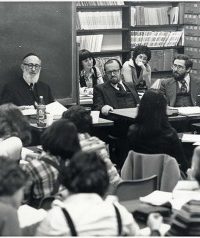Follow Us
Support Kol Hamevaser!
Contact us for advertising and sponsorship opportunities at [email protected]Current Issue
- Letter from the Editor
- Why and How We Study Mahshava
- Of Concepts and Precision: Understanding Torat Brisk
- Midrash and Intertextuality: Stringing like Beads the Words of Torah
- The Mishnah Berurah’s Treatment of Kabbalistic Sources
- Blowing and Bawling
- Conflict and Paradox: Balancing Emotion, Intellect, and Neo-Hassidut
- Issue 10.1 Derekh Ha-Limmud
- Issue 10.1 Symposium
Recent Issues
9.5 Israel (Text | PDF)
9.4 Hassidut (Text | PDF)
9.3 History and Storytelling (Text | PDF)
9.2 Nature (Text | PDF)
9.1 Jewish Philosophy in the 21st Century (Text | PDF)
8.4 Tanakh in the 21st Century: Looking Back, Looking Ahead (Text | PDF)
8.3 Jewish Community: Models and Ideals (Text | PDF)
8.2 Judaism and Other Faiths (Text | PDF)
8.1 The World of the Beit Midrash (Text | PDF)
7.5 Privacy (Text)
7.4 Freedom (Text)Archives
Articles by Gilad Barach
Rav Soloveitchik’s Bold Stance on Kedushat Erets Yisrael
One aspect of R. Joseph B. Soloveitchik’s philosophy that distinguishes him from other prominent Orthodox Jewish thinkers is his boldness in challenging conventional ideas while remaining true to halakhic principles. In one such instance, the Rav breaks away from a prominent opinion among ... Read more →
All About the Blue
Reviewed Book: Baruch Sterman, The Rarest Blue: The Remarkable Story of an Ancient Color Lost to History and Rediscovered (Guilford, CT: Lyons Press, 2012) In the past twenty years, a new candidate has emerged for the biblical tekhelet, a central component of the mitsvah of tsitsit as ... Read more →
Between Spontaneity and Structure: Two Models of Prayer
In a lengthy article highlighting distinctions between the religious worlds of biblical Judaism and modern observance, R. Yuval Cherlow expresses regret about how certain historical institutions have frozen prayer’s form, consequently dulling its vibrancy in the eyes of many Jews. The ... Read more →
Quantum Physics as a Natural Avenue for Divine Intervention
[i] About a century ago, a series of ideas and experiments developed into the theory of quantum physics and overturned many of the principles established centuries earlier by Isaac Newton. The new science also overturned prior difficulties posed by the clash between natural law and Jewish ... Read more →
What Happens to the Dangerous Shoteh?
Law and order are at the core of any civilization. The Torah emphasizes their significance in demanding that courts be active not only in Jewish society[i] but in non-Jewish Noahide society as well.[ii] Due to the prevalence of these courts, the notion that crime calls for punishment is ... Read more →
Brother, Not Other: Rambam’s Loving Embrace of Converts
It may sound surprising to the contemporary Jew, but classical Jewish sources do not unanimously favor converts. This unsympathetic attitude present in some texts even goes beyond the three initial rebuffs in the conversion process;[i] even after the full halakhic conversion is complete, much ... Read more →
Nakh: The Neglected Nineteen
1 Why learn Nakh?2 It is a foolish question, really. Virtually all Torah Jews agree that learning Nakh constitutes talmud Torah, and it should therefore follow that a Jew’s familiarity with all twenty-four books of Tanakh is not only proper and appropriate, but mandated and expected. ... Read more →




The Meaning of “Next Year in Jerusalem”